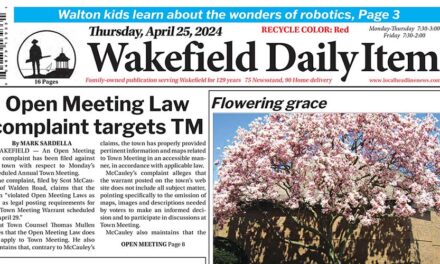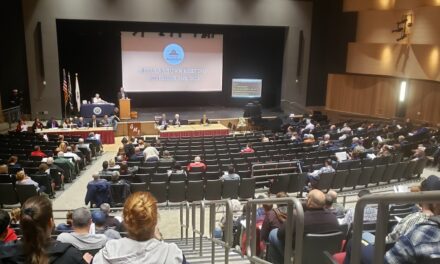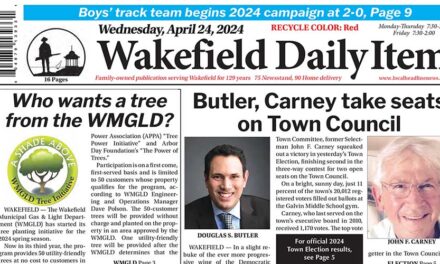Published in the December 5, 2019 edition.
By MARK SARDELLA
When any person or group tells you that they want to “reform” the way we conduct elections to make voting more “fair” and increase voter “participation,” your BS detector should go off.
Because when it comes to elections, one thing and only one thing matters: winning. When proposals are advanced to change how elections are run, the first question you should ask is, “Which group, party or candidates will benefit from these changes?”
People who say they care about voter turnout and making it easier to vote are lying. This may come as a shock to you, but people are willing to lie to win elections.
Another red flag is the label “nonpartisan.” When any group seeking to tinker with our elections goes out of its way to tell you that it’s “nonpartisan,” find a shovel, fast.
These basic principles came in handy as I read a study released last month called, “MassForward: Advancing Democratic Innovation and Electoral Reform in Massachusetts.”
I’ll let you draw your own conclusions from the title, but here’s another tipoff: any time the word “forward” is in the title, things are about to go sideways.
The authors of the study specifically invite informed voters, advocates, civic leaders, elected officials and journalists to read their report and “mount a timely response.”
OK, here’s mine. You’re welcome.
Conducted by the Massachusetts Institute for a New Commonwealth (MassINC) and the Jonathan M. Tisch College of Civic Life at Tufts University, the study purports to be “nonpartisan” but to paraphrase Bob Dylan, you don’t need a Weatherman to know which way the wind is blowing in these 31 pages. The first hint comes in the first three words of the Introduction.
“From climate change to job automation, Massachusetts confronts a range of enormously challenging policy problems.”
I understand that no dissent is allowed on the topic of climate change, but when a study’s opening sentence places climate change foremost among the state’s “enormously challenging problems,” that study clearly has a point of view.
Speaking of climate change, the Introduction goes on to identify two endangered species in Massachusetts: The Republican Party and the “independent local news media.” More on this odd pairing later.
The study identifies “Four Structural Weaknesses” that “inhibit residents from participating fully in state and local civic life.”
First and foremost, we have too damn many elections.
“Holding many different elections reduces turnout and advantages voters with greater means,” the study informs us.
That’s right. The problem is, the masses are given too many opportunities to vote. No wonder we’re in such a mess!
Second, “Our elected officials do not reflect our diversity.” The authors appear to be far more obsessed with race, ethnicity and gender than the average Massachusetts voter, spending many pages explaining how the people, damn them, have somehow managed to elect local and state leaders that don’t precisely match the demographic breakdown of the population.
The authors find this horrifying, and proceed to list the exact numbers of women and “people of color” that would be needed in the legislature to rectify this travesty. Because skin pigmentation and chromosomes, not ideas, are what really matter.
But race and gender composition are not the only problems in the legislature, the authors inform us. There is also a disparity in party representation. (I wonder how long it took this think tank to arrive at this conclusion.)
“Democrats hold 80 percent of the seats in the state legislature, yet they account for just one-third of registered voters,” the study notes. “Republicans and voters who lean Republican make up 27 percent of voters in Massachusetts. To reflect the partisan values of the voters, the legislature would need an additional 16 Republican members.”
The authors’ concern for the scarcity of Republicans in the legislature is touching. Perhaps it would help if they asked their friends in the other party to stop comparing every Republican to Hitler.
Despite bemoaning party imbalance in the state, the authors proceed to advocate a series of measures that would almost certainly hasten the extinction of the Massachusetts Republican Party.
First, they call for “allowing youth to vote in municipal elections.”
“Voting for the first time while in high school would allow students to learn the mechanics of registration and voting and to experience nonpartisan discussions of important issues before their first election.”
Nonpartisan discussions in high school? Have these authors been inside a public high school in the last 30 years? And which candidates do they think kids — who’ve never held a job, owned a home or paid taxes — are likely to vote for?
Another measure the authors call for is “synchronizing state and local elections” to increase turnout.
“Holding local elections in odd years when state and federal offices are not in play,” the authors intone, “is a failsafe way of dramatically reducing turnout.”
Maybe. But in a one-party dominated state, holding local elections at the same time as state and federal elections is a failsafe way of making sure that candidates aligned with the minority party never win a local election. The authors know this. Do they think we’re stupid?
Election Day registration is another “reform” recommended in the study. Leaving aside the built-in potential for voter fraud, the question once again is, who benefits? The answer is political activists willing to pull people off the street on Election Day with the offer of a cup of coffee or a sandwich in exchange for a vote. Not registered? No problem! You can register at the polling place when we drop you off.
Then there’s ranked choice voting. There isn’t enough space in this newspaper to explain how this kooky idea works. Again, if you want to know who benefits from this convoluted system, look at who is advocating for it. (Hint: It’s not the minority party in the state of Massachusetts.)
This concentrated power in one party is “problematic” (my new favorite word), the authors tell us, when “opposition parties and the press lack capacity to provide oversight.”
Again, they lump Republicans and the press together. I never knew we had so much in common!
The authors cite a sharp decline in newspaper staff since 2001. “As local news coverage declines, civic engagement falls and citizens’ ability to check the state legislature’s highly concentrated power diminishes.”
The authors suggest that the legislature step in and “ensure that residents in all of our communities have access to quality state and local news.”
Not sure exactly what that means, but the idea that the authors want our ethnically unbalanced, one-party-dominated, unrepresentative legislature to step in and fix journalism is curious.
The authors acknowledge the obvious problems with government involvement in the press, but just as quickly dismiss them.
“While offering public funding for journalism raises serious concerns about press freedom,” the authors allow, “public broadcasting demonstrates how independent reporting can thrive with public support.”
The fact that these authors see NPR and PBS as models of fair, unbiased and independent journalism tells you everything you need to know about their own predilections.
Another “solution” offered by the authors is for the government to provide funding for candidates to run in elections in order to “increase the racial, economic and gender diversity of those running for office.”
Let’s see, having the legislature oversee the press while the government pays candidates to run for public office in ranked-choice elections in which children are allowed to vote.
What could possibly go wrong?





